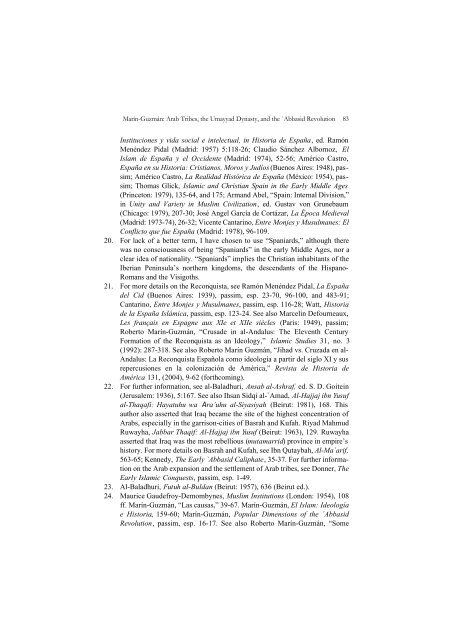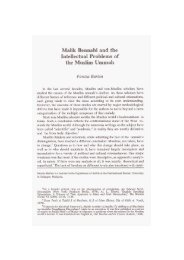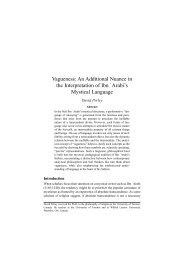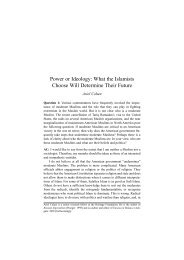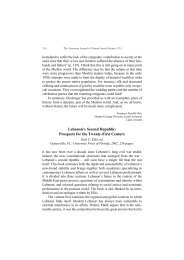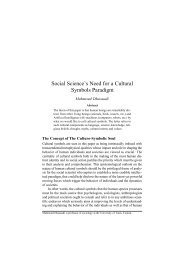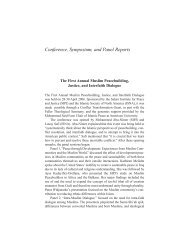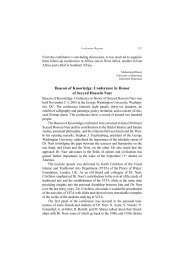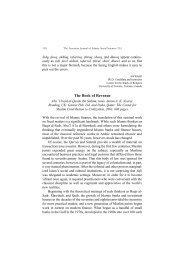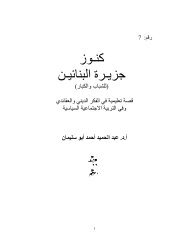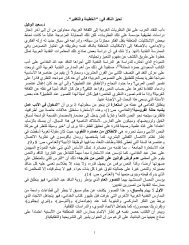Arab Tribes, the Umayyad Dynasty, and the `Abbasid ... - Epistemology
Arab Tribes, the Umayyad Dynasty, and the `Abbasid ... - Epistemology
Arab Tribes, the Umayyad Dynasty, and the `Abbasid ... - Epistemology
Create successful ePaper yourself
Turn your PDF publications into a flip-book with our unique Google optimized e-Paper software.
Marín-Guzmán: <strong>Arab</strong> <strong>Tribes</strong>, <strong>the</strong> <strong>Umayyad</strong> <strong>Dynasty</strong>, <strong>and</strong> <strong>the</strong> <strong>`Abbasid</strong> Revolution 83<br />
Instituciones y vida social e intelectual, in Historia de España, ed. Ramón<br />
Menéndez Pidal (Madrid: 1957) 5:118-26; Claudio Sánchez Albornoz, El<br />
Islam de España y el Occidente (Madrid: 1974), 52-56; Américo Castro,<br />
España en su Historia: Cristianos, Moros y Judíos (Buenos Aires: 1948), passim;<br />
Américo Castro, La Realidad Histórica de España (México: 1954), passim;<br />
Thomas Glick, Islamic <strong>and</strong> Christian Spain in <strong>the</strong> Early Middle Ages<br />
(Princeton: 1979), 135-64, <strong>and</strong> 175; Arm<strong>and</strong> Abel, “Spain: Internal Division,”<br />
in Unity <strong>and</strong> Variety in Muslim Civilization, ed. Gustav von Grunebaum<br />
(Chicago: 1979), 207-30; José Angel García de Cortázar, La Época Medieval<br />
(Madrid: 1973-74), 26-32; Vicente Cantarino, Entre Monjes y Musulmanes: El<br />
Conflicto que fue España (Madrid: 1978), 96-109.<br />
20. For lack of a better term, I have chosen to use “Spaniards,” although <strong>the</strong>re<br />
was no consciousness of being “Spaniards” in <strong>the</strong> early Middle Ages, nor a<br />
clear idea of nationality. “Spaniards” implies <strong>the</strong> Christian inhabitants of <strong>the</strong><br />
Iberian Peninsula’s nor<strong>the</strong>rn kingdoms, <strong>the</strong> descendants of <strong>the</strong> Hispano-<br />
Romans <strong>and</strong> <strong>the</strong> Visigoths.<br />
21. For more details on <strong>the</strong> Reconquista, see Ramón Menéndez Pidal, La España<br />
del Cid (Buenos Aires: 1939), passim, esp. 23-70, 96-100, <strong>and</strong> 483-91;<br />
Cantarino, Entre Monjes y Musulmanes, passim, esp. 116-28; Watt, Historia<br />
de la España Islámica, passim, esp. 123-24. See also Marcelin Defourneaux,<br />
Les français en Espagne aux XIe et XIIe siècles (Paris: 1949), passim;<br />
Roberto Marín-Guzmán, “Crusade in al-Andalus: The Eleventh Century<br />
Formation of <strong>the</strong> Reconquista as an Ideology,” Islamic Studies 31, no. 3<br />
(1992): 287-318. See also Roberto Marín Guzmán, “Jihad vs. Cruzada en al-<br />
Andalus: La Reconquista Española como ideología a partir del siglo XI y sus<br />
repercusiones en la colonización de América,” Revista de Historia de<br />
América 131, (2004), 9-62 (forthcoming).<br />
22. For fur<strong>the</strong>r information, see al-Baladhuri, Ansab al-Ashraf, ed. S. D. Goitein<br />
(Jerusalem: 1936), 5:167. See also Ihsan Sidqi al-`Amad, Al-Hajjaj ibn Yusuf<br />
al-Thaqafi: Hayatuhu wa Ara’uhu al-Siyasiyah (Beirut: 1981), 168. This<br />
author also asserted that Iraq became <strong>the</strong> site of <strong>the</strong> highest concentration of<br />
<strong>Arab</strong>s, especially in <strong>the</strong> garrison-cities of Basrah <strong>and</strong> Kufah. Riyad Mahmud<br />
Ruwayha, Jabbar Thaqif: Al-Hajjaj ibn Yusuf (Beirut: 1963), 129. Ruwayha<br />
asserted that Iraq was <strong>the</strong> most rebellious (mutamarrid) province in empire’s<br />
history. For more details on Basrah <strong>and</strong> Kufah, see Ibn Qutaybah, Al-Ma`arif,<br />
563-65; Kennedy, The Early <strong>`Abbasid</strong> Caliphate, 35-37. For fur<strong>the</strong>r information<br />
on <strong>the</strong> <strong>Arab</strong> expansion <strong>and</strong> <strong>the</strong> settlement of <strong>Arab</strong> tribes, see Donner, The<br />
Early Islamic Conquests, passim, esp. 1-49.<br />
23. Al-Baladhuri, Futuh al-Buldan (Beirut: 1957), 636 (Beirut ed.).<br />
24. Maurice Gaudefroy-Demombynes, Muslim Institutions (London: 1954), 108<br />
ff. Marín-Guzmán, “Las causas,” 39-67. Marín-Guzmán, El Islam: Ideología<br />
e Historia, 159-60; Marín-Guzmán, Popular Dimensions of <strong>the</strong> ´Abbasid<br />
Revolution, passim, esp. 16-17. See also Roberto Marín-Guzmán, “Some


